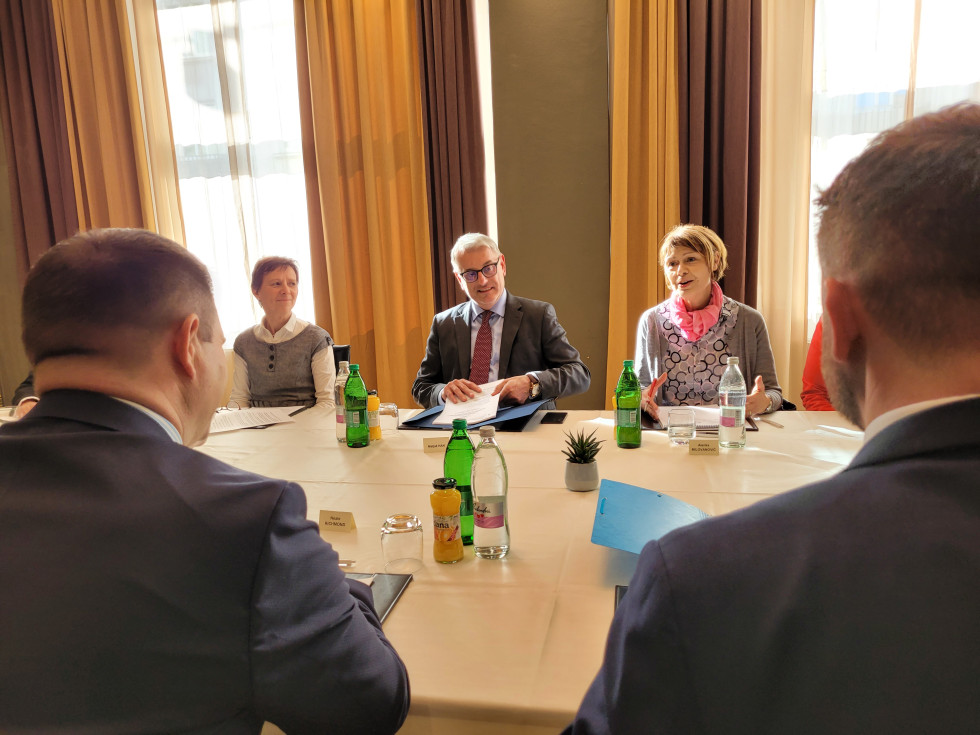Minister Han and Irish Minister for Enterprise Richmond discuss strengthening economic cooperation
At the meeting, the Minister for the Economy, Tourism and Sport, Matjaž Han, underlined that, while relations between the two countries are excellent, there are still many opportunities for strengthening cooperation in the economic field. He therefore welcomed the visit of the Irish Minister to the Chamber of Commerce and Industry of Slovenia.
The two ministers also discussed European issues, in particular the future industrial policy and the functioning of the EU's common market. Both are crucial for the economic development of the EU and its Member States.
Regarding the future industrial policy, they stressed that the EU needs a new, more ambitious industrial policy, which is important both from the point of view of strategic independence and the need to increase the EU's competitiveness in the world. Minister Han emphasised: "The EU must reduce regulation and burdens on industry and do everything possible to ensure that companies bring industrial production back to Europe."
The two ministers agreed that the EU is currently facing a number of problems that are weakening the European economy. Among them, they highlighted the poor functioning of capital markets and the lack of venture capital, especially for new and growing companies, the poor demographic picture and the labour force shortage, which is severely crippling industry. Minister Han also stressed the need for more flexible and uniform state aid rules, which are important for boosting European industry, while also removing unnecessary administrative and bureaucratic burdens on business.
Neale Richmond, Irish Minister for Enterprise, Trade and Employment, said that the EU had relied too much on third country economies over the last decade, which had proved to be unstrategic. He believes the EU needs to focus on its strengths and opportunities. It must invest more in training people in new areas such as digitalisation, artificial intelligence and new technologies. It must increase investment in research and development, digitalisation and robotics, and space technologies, while at the same time increasing access to various forms of capital, especially venture capital.
Minister Han pointed out that Slovenia, which is the third most industrialised country in the EU, attributes an important role to energy-intensive industries, the aerospace sector, the automotive industry, digital technologies, the pharmaceutical industry, and biotechnology.
Ireland is listed as a market of opportunity for Slovenian companies. There is potential to strengthen business cooperation in the areas of high, modern and green technologies, such as renewable energy and energy efficient technologies. In addition, there is potential in the fields of artificial intelligence and cyber security, the forestry and wood industries, information and communication technologies, green manufacturing and the circular economy, renewable energy, the automotive industry and e-mobility, creative industries, transport and logistics, and healthcare.
The Ministers also highlighted the strong potential in the field of tourism, which requires the establishment of a regular air link between the two countries, and therefore both Ministers support any discussions of the establishment of a route between Slovenia and Ireland. Irish tourists are demanding active holidays in nature and spa tourism, which Slovenia offers.
Economic cooperation between the two countries
Ireland has a small, modern, market-oriented economy, dominated by large global corporations, especially in the technology, chemical and pharmaceutical sectors. Local activity is dominated by retail trade and construction.
Ireland is Slovenia's 38th largest foreign trade partner. Last year, trade amounted to EUR 224.2 million (minus 22 per cent). Exports of goods to Ireland amounted to EUR 71.3 million (plus 13 per cent), while imports amounted to EUR 152.9 million (minus 31 per cent). Pharmaceuticals dominate both Slovenia's imports from and exports to Ireland. Exports in 2023 consisted of pharmaceuticals (21 per cent), prefabricated buildings (10 per cent), heterocyclic compounds (6 per cent), electrical apparatus (5 per cent), boxes, cases, crates, bags (2.5 per cent), instruments, appliances and machinery for measuring or checking (2.5 per cent). Last year, the most imported were medicines (55 per cent), ethyl alcohol (6 per cent), prepared blood for therapeutic uses (5 per cent), pharmaceutical goods (4 per cent), cellulose (2.4 per cent) and boxes, cases (1.6 per cent).
Trade in services exceeds trade in goods, amounting to EUR 480 million in 2022 (plus 9 per cent; exports: EUR 131.4 million, imports: EUR 348.7 million). Main export and import services: information and communication technology and other business services.
In 2022, direct investment from Slovenia to Ireland amounted to EUR 9.8 million, while Irish investment in Slovenia amounted to EUR 64.6 million. There are 23 business entities with Irish capital in Slovenia, with Primark having the largest share.
In tourism, we recorded 23,600 Irish visitors last year (plus 25 per cent) and 61,800 overnight stays (plus 24 per cent).


